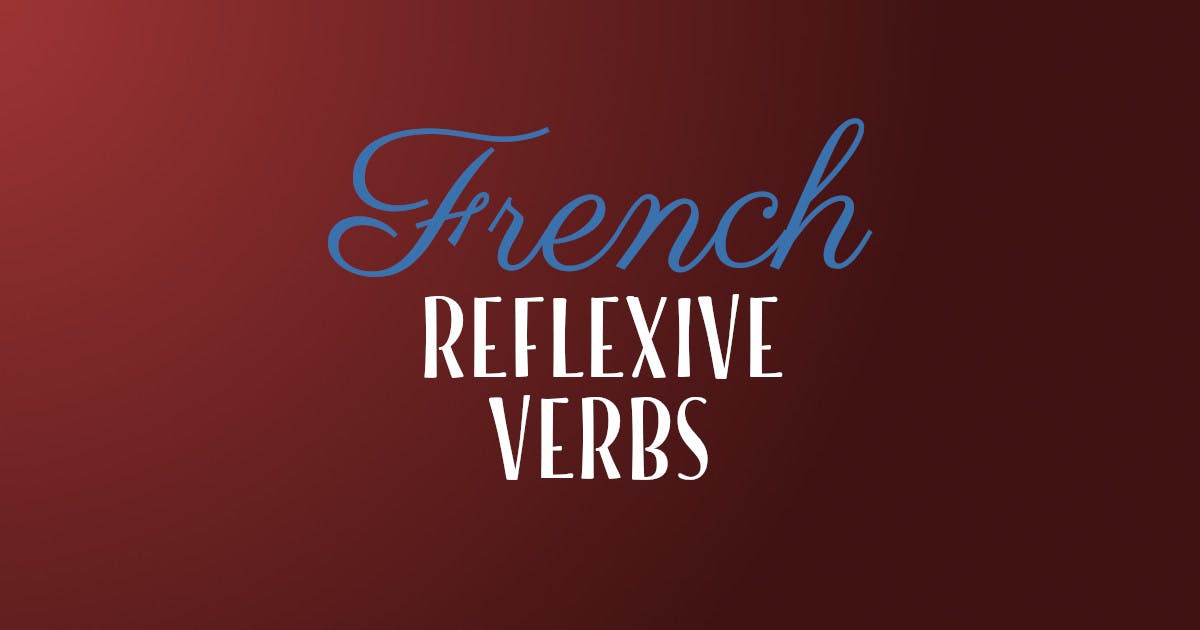Reflexive Verbs In French (Explained With Examples)
Reflexive verbs in French are used when the subject of a sentence performs an action on itself.
In French, reflexive verbs (les verbes pronominaux) are accompanied by reflexive pronouns (me, te, se, nous, vous and se).
Je me lève à sept heures.
As you can see, the act of 'getting up' is being done by "je" (I) to "me" (me).
Keep reading and I'll help you understand reflexive verbs, how to conjugate them, and how they're applied in daily conversations.
Conjugating Reflexive Verbs
To conjugate reflexive verbs, include the appropriate reflexive pronoun before the verb and conjugate the verb as usual. The reflexive pronouns are:
- Je → me (or m' before a vowel)
- Tu → te (or t' before a vowel)
- Il/Elle/On → se (or s' before a vowel)
- Nous → nous
- Vous → vous
- Ils/Elles → se
Conjugation of se lever (to get up)
Here's how se lever is conjugated in the present tense:
| Subject Pronoun | Reflexive Pronoun | Verb Conjugation | Full Conjugation | English Translation |
|---|---|---|---|---|
| Je | me | lève | Je me lève | I get up |
| Tu | te | lèves | Tu te lèves | You get up |
| Il/Elle/On | se | lève | Il/Elle/On se lève | He/She/One gets up |
| Nous | nous | levons | Nous nous levons | We get up |
| Vous | vous | levez | Vous vous levez | You get up (formal/plural) |
| Ils/Elles | se | lèvent | Ils/Elles se lèvent | They get up |
Daily Routine with Reflexive Verbs
Reflexive verbs are commonly used to describe daily routines, especially actions you perform on yourself.
Common Reflexive Verbs
- se laver - to wash oneself
- se brosser - to brush oneself
- se raser - to shave oneself
- s'habiller - to dress oneself
- se coucher - to go to bed
Examples
Je me lave le visage.
Je me brosse les dents.
Je me rase.
Try substituting other subjects and verbs to practice:
- Tu te laves le visage. (You wash your face.)
- Il se brosse les dents. (He brushes his teeth.)
- Elle se rase les jambes. (She shaves her legs.)
Reflexive verb rules
Here are some general rules you need to remember when it comes to French reflexive verbs.
Reflexive pronouns
As stated already, reflexive pronoun changes according to the subject:
- Je me
- Tu te
- Il/Elle/On se
- Nous nous
- Vous vous
- Ils/Elles se
Placement in sentences
Affirmative Sentences: The reflexive pronoun precedes the verb.
Nous nous parlons.
Negative Sentences: Place ne before the reflexive pronoun and pas after the verb.
Je ne me lève pas tôt.
Infinitive Constructions
When two verbs are used together, the reflexive pronoun precedes the infinitive.
J'espère m'acheter une voiture.
Commands (Imperatives)
Affirmative Commands: The reflexive pronoun follows the verb and is connected with a hyphen. Use toi instead of te for tu commands.
Peigne-toi les cheveux.
Negative Commands: The reflexive pronoun precedes the verb.
Ne vous arrêtez pas!
Mutual Actions
Reflexive verbs can express mutual actions.
Ils s'aiment.
Reflexive vs. Non-Reflexive Verbs
Using the incorrect reflexive pronoun can change the meaning of the sentence.
Reflexive:
Je me proclame roi.
Non-Reflexive:
Je proclame le début des jeux.
Reflexive verbs that always require reflexive form
Some verbs are always used reflexively:
- s'écrier - to exclaim or cry out
- s'en aller - to leave or go away
- se fier à - to trust
- se méfier de - to distrust
- se moquer de - to make fun of
- se soucier de - to care about
- se souvenir de - to remember
Mastering reflexive verbs is a vital step toward speaking French.
They're used all the time in daily conversations, so you'll need to learn them.

SUBSCRIBE: